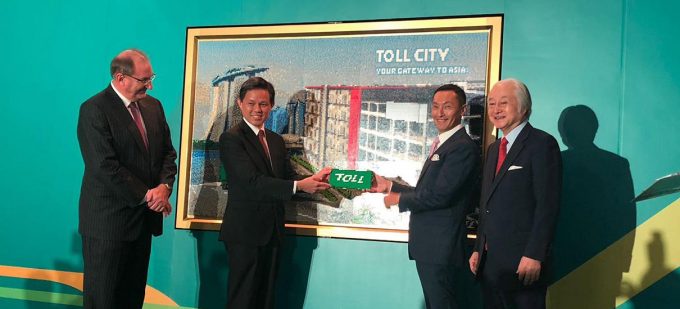'Toxic' boxes taken off Maersk-chartered ships for return to origin
More than 100 containers onboard two Maersk-chartered ships will be offloaded in Singapore and returned ...
GM: RAISING THE ROOF GGM: IN FULL THROTTLE GZIM: MAERSK BOOST KNIN: READ-ACROSSMAERSK: NOT ENOUGHMAERSK: GUIDANCE UPGRADEZIM: ROLLERCOASTERCAT: HEAVY DUTYMAERSK: CATCHING UP PG: DESTOCKING PATTERNSPG: HEALTH CHECKWTC: THE FALLGXO: DEFENSIVE FWRD: RALLYING ON TAKEOVER TALKODFL: STEADY YIELDVW: NEW MODEL NEEDEDWTC: TAKING PROFIT
GM: RAISING THE ROOF GGM: IN FULL THROTTLE GZIM: MAERSK BOOST KNIN: READ-ACROSSMAERSK: NOT ENOUGHMAERSK: GUIDANCE UPGRADEZIM: ROLLERCOASTERCAT: HEAVY DUTYMAERSK: CATCHING UP PG: DESTOCKING PATTERNSPG: HEALTH CHECKWTC: THE FALLGXO: DEFENSIVE FWRD: RALLYING ON TAKEOVER TALKODFL: STEADY YIELDVW: NEW MODEL NEEDEDWTC: TAKING PROFIT

Japan Post’s Toll Group plans to use the launch of its Toll City flagship facility in Singapore as a springboard to expand its Asia Pacific network.
The S$228m next-generation logistics facility has 100,000sq metres of warehousing capacity across seven floors and boasts a raft of cutting-edge logistics technology, including driverless vehicles, smart-city telematics, 3D-printing and RFID.
According to Vincent Phang, executive vice president of Toll Global Logistics Singapore, Toll City will boost the 3PL’s 11-country Asia network, particularly for retail, FMCG and healthcare customers.
“Our goal is to grow our network in South-east Asia, China and India,” he told The Loadstar. “We’re looking to develop these sectors.
“The retail and FMCG space offers a lot of opportunity and Toll City gives us the ability to structure end-to-end supply chains for our customers.”
With Toll’s Global Logistics and Global Forwarding divisions already headquartered in Singapore, Mr Phang said the logistics hub would help create new opportunities between contract logistics and freight forwarding.
Based 3km from Tuas, the site of Singapore’s future 65m teu mega-port, the new gateway enjoys strong road links with Malaysia and Singapore’s growing Jurong region, making it an excellent land-sea interface, according to Toll.
Toll City is also home to what the company dubs its SiTadeL Control Tower, which Mr Phang describes as a “nerve centre” that “addresses Singapore’s urban logistics challenges with real-time visibility and monitoring of moving assets”.
These urban logistics challenges include land scarcity and labour constraints.
According to Mr Phang, the firm is piloting new technologies which augment manual labour to improve safety and efficiency, including automated machine handling equipment, in-warehouse cycle counting drones, voice picking and intelligent conveyor systems, augmented reality glasses for navigation and instruction and exoskeletons for warehouse operations.
“We’re certainly down the path of augmenting and automating our processes so we can be a little less-reliant on labour, and that’s just how the demographics have required us to plan in advance,” said Mr Phang. “Toll City gives us the advantage of piloting some of our logistics concepts in a very urbanised environment, and that’s where we think the growth is going to be: the big cities across Asia.”
Meanwhile, he said, Toll’s business has so far been unaffected by rising global trade tensions.
“The first half went OK for us. We are watching the events and I think it’s fair to say there hasn’t been any impact on us at the moment and our clients’ supply chains haven’t been affected.
“That said, I certainly think trade flows are going to change; there will be pressure on the traditional manufacturing bases in China and it remains to be seen what will happen from there.
“But Singapore is well-positioned as a country with its infrastructure around the port and airport, and hopefully that continues to be a source of confidence for global trade flows.
“With all the changes it’s important to be agile, and that’s what we plan to be. Hopefully, the investment we’ve put into Toll City will help us in this changing landscape,” said Mr Phang.
Comment on this article
Mark
July 28, 2018 at 6:01 pmSeems more on the ‘gimmicky’ side. Good PR. With no publishing on suppliers used, amount invested. Had they said we’re going to have a fully automated warehouse with 10 AS/RS machines that would be more believable